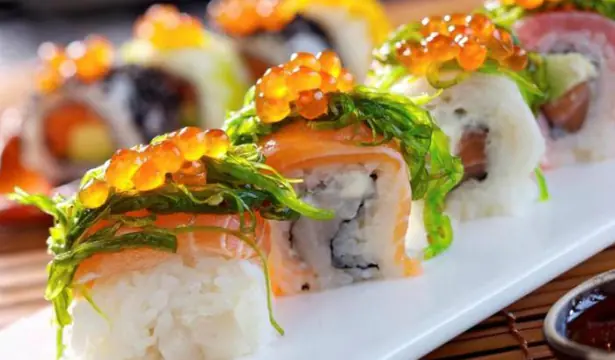The popular Japanese dish, which many call an example of healthy food, cannot be considered as such. Nutritionists have found that sushi will not help you lose weight and is even more harmful than hamburgers.
According to The Daily Mail, American nutritionist Rachel Beller assessed the energy value of standard servings of sushi and found that a regular California roll, which is usually made from rice, avocado slices and fish, contains 290-350 calories, which is equivalent to half a chocolate bar. In addition, one such roll will contain as many carbohydrates as two sandwiches with white bread, crab sticks, avocado and greens.
Thus, a more or less complete lunch of three of these rolls will provide the body with 1050 calories, and the average set of sushi will contain 755 calories, which is more than a Big Mac with a small portion of french fries.
It is noted that sushi consists mainly of processed rice, devoid of most nutrients and vitamins, and there is very little fish in it. A regular sushi roll contains no more than 5 grams of fish, while doctors recommend eating at least 70-120 grams of seafood per day. The nori and kombu seaweed in which the rolls are wrapped are unlikely to have any effect on health. There is only one gram of seaweed per sushi.
The Daily Mail newspaper, having analyzed standard sushi sets sold in the UK, found that they contain no more than 36 grams of fish. The so-called “vegetarian sushi” also turned out to be poor in vegetables and vitamins.
Another type of sushi, sashimi, can be much healthier than rolls: this is a piece of raw fish placed on rice, but you need to be absolutely sure of its freshness.
The fashion for sushi appeared in Europe and the USA thanks to the fame of the longevity of the Japanese. However, in Japan itself, sushi (both rolls and sashimi) is perceived as an expensive delicacy, for which only freshly caught fish can be used. The average cost of a set of sushi in Tokyo is about 3500-4000 yen (about 40-45 dollars). In the daily diet of the Japanese, it is not sushi that is most often found, but rice dishes (curry rice, rice balls), various types of noodles and soups based on miso paste.



